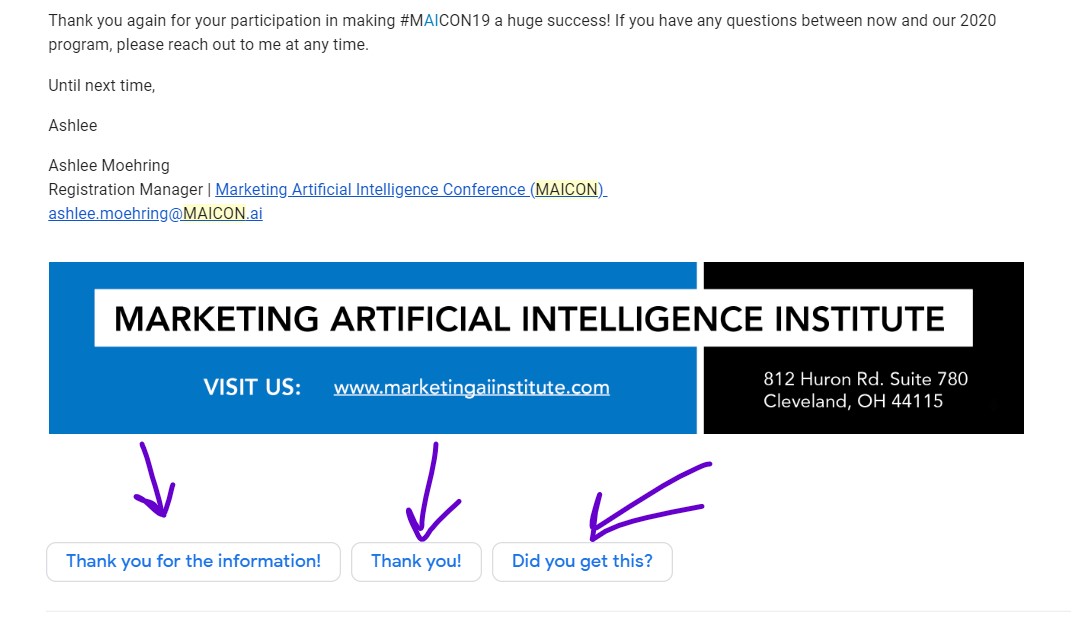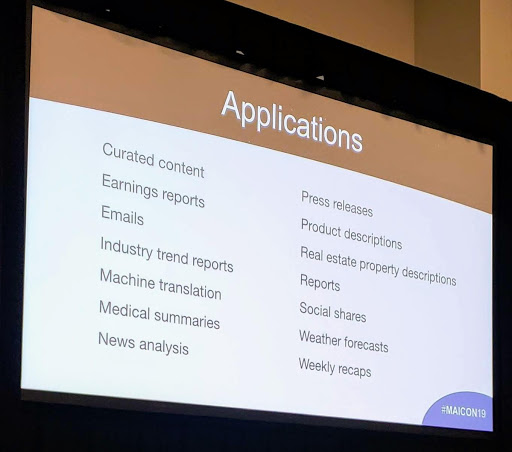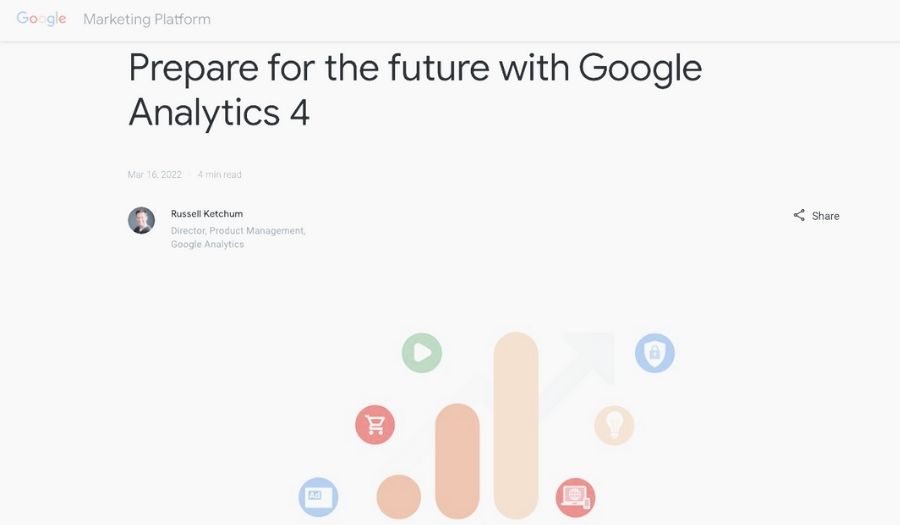Artificial Intelligence and Marketing: Creating More Efficient Engagement at Scale
Updated January 2023
It's taken a few years, but 3.5 years after attending a conference about artificial intelligence and marketing, now it's all happening. ChatGPT and other tools help realize the promise of authentic, compelling content that will produce scalable engagement for our clients.
Much of what I wrote in 2019 is now reality:
- You can get first drafts of anything--words, video, images--very quickly and easily with AI. The art of engaging and persuading? Not AI.
- AI will simplify data analysis, improving marketing outcomes without increased marketing budgets. The art of understanding your target? Not AI.
- Increase marketing efficiencies? That's AI.
2019 MAICON Highlights Below:
- Artificial intelligence is already part of our daily lives. Netflix suggests new shows to watch, Amazon serves up related items for purchase consideration. And if you have a friend named Siri or Alexa, you know that artificial intelligence plays a large role in voice search, which continues to increase.
- AI is finding its way into our professional lives, too. Below, Gmail suggests responses to an email--which just happened to be the follow up email from the MAICON organizers, anticipating that I may respond or forward the email.

- In marketing, artificial intelligence already supports Google Analytics and Google Ads serving up suggestions based on data trends. We heard from multiple vendors at the conference--some noted below--who are innovating on platforms to improve and streamline content marketing. The promise is that AI will help marketers make sense of the firehose of data we have coming at us, but it won’t replace us. “AI doesn’t replace humans--it helps unlock human’s potential,” Roetzner said in his opening keynote. “Machines aren’t making decisions. They take in data and make predictions and recommendations. AI makes marketing technology smarter. “
- Content--specifically writing--is the marketing area where artificial intelligence will have the greatest impact in the near term. In fact, Roetzner’s agency already offers press releases “written” by AI. Keynoter Chris Penn of TrustInsights.ai referenced the ability to feed tweets into a platform and have it produce new tweets. In terms of content creation, “We will be using AI to create blogs, scripts, tweets, and more,” he said.
- Marketing automation will also change more rapidly. Where we have previously been focused on pre-defined nurturing steps to move a customer along the buyer journey, artificial intelligence will recommend nurturing steps that are less reliant on website visitors filling out forms to get the right information to the right stakeholder at the right time.
Penn Identified three things companies need to get started in AI for marketing:
- Developers to write the code
- Data scientists to refine the data
- Marketing technologists to put it into production. (For smaller companies, Chris says to start with marketing technologists and existing platforms.)
What Is Artificial Intelligence?
.jpg?width=800&name=Copy%20of%20Dialogue%20Blog%20Quote%20Visual%20(2).jpg)
Before last week, I really wasn’t sure I really understood what all the terms meant. So before I go on, let’s start with a few definitions:
Artificial Intelligence: AI is the broad umbrella concept of all things related to how computers can mimic the cognitive functions of the human brain.
Augmented Intelligence: Another way to describe artificial intelligence and machine learning that emphasizes the continued human role in realizing AI’s full potential.
Machine Learning: Machine learning is the primary subset of AI, where computers use algorithms and models to learn how to respond and to continue improving without being continually programmed.
Natural Language Processing (NLP): is another subset of AI where computers learn to recognize--and generate--speech. NLP supports voice search among other things.
Natural Language Generation (NLG) is the function of machines to generate content. This technology won’t replace writers, but it will help writers to be better and more efficient.
Pros and cons of artificial intelligence in marketing
Artificial intelligence gives marketers superpowers for audience targeting, predicting behaviors and helping us make sense of all the signals.
- Artificial intelligence will enhance the user experience, delivering a desirable experience with brands and ideas, because our interaction with them will be based on what we know our stakeholders really want and value.
- Technology will further democratize a lot of aspects of marketing, putting data-driven, personalized marketing within reach of businesses both large and small.
- Communicators have the best tool they’ve ever had to link public sentiment to messaging strategy - improving our ability to get leadership buy-in with meaningful insights.
- Data-driven first drafts will free up creatives to focus on refining the message to make the emotional connections with our stakeholders.
- Repetitive tasks will be automated, making our teams more efficient.
- Marketing will become more cost efficient, and the companies who will win will redirect that spend to invest in innovation, purpose and culture -- which will have a positive impact on the business and the world at large.
There are also downsides related to artificial intelligence and marketing. For better and worse, AI will likely change the course of human history; Google’s CEO considers artificial intelligence to be as momentous as fire and electricity. Roetzer recommended reading Tim Urban’s WaitButWhy post on artificial intelligence. I suggest doing so with a nice big glass of red wine, but it is worth reading because...
- ...even without this big hairy stuff in the future, there are ethical questions and pitfalls for communicators right now. We need to be aware of how we use our skills of persuasion combined with an increased ability to deliver personalized information. Chris Penn said, “Always ask yourself: how can this be misused?” A good start for guiding principles is the Public Relations Society of America (PRSA) Code of Ethics.
- Related: Karen Hao, artificial intelligence reporter for MIT Technology Review, cautioned about the intrinsic western bias in current AI systems. She used the example of facial recognition being able to recognize western brides and grooms, but not all brides and grooms around the world.
- The technology still isn't resolving data between entities. Resolving the different names, email and IP addresses we use on different platforms has been an issue for database marketers for decades.
- It’s possible - especially at first - that user experiences could go from bad to worse with newer technologies. I’m looking at you, chatbots. A lot of this stuff is still really early stage. Go slow. Test and learn and avoid technology for technology’s sake. Keep your eye on the customer experience as your North Star.
- One word: Privacy.
Questions to Think About in Evaluating Marketing Artificial Intelligence Vendors:
- Will this tool make you more efficient or improve the customer experience?
- What are you doing with my data?
- How much data is needed to make it work?
- What format is needed for the data we supply?
- What happens if your technology is down and inaccessible?
- What happens to our information of you go out of business?
MAXG
MAXG bills itself at the world’s first AI-powered marketing recommendation engine, functioning much like Google Analytics’ recommender engine to help make sense of multiple data sets to improve things like landing page performance. It was built by a marketing agency and spun off from that agency to be a platform for all agencies and marketers.
PathFactory
PathFactory won me over with its Seth-Godin-like ethos to “stop marketing” and start focusing on being helpful to buyers. It is a content recommendation engine. Their VP of marketing, Elle Woulfe, led a MAICON session about “the consumerization of B2B” asking why can’t B2B buying be more like Netflix with “hyper-personalized recommendations” that get B2B buyers to “binge” on content that enables them to self-direct their buyer journey.
Woulfe defined buyer journey content as “what is consumed before they talk to you.”
MarketMuse
MarketMuse is another content marketing solution that offers a free tool to demonstrate how it works. Enter an article from your blog on the home page and see how it serves up suggestions compared to 1,000s of similar articles online in just about two minutes.
How artificial intelligence will impact marketing jobs
With all this talk about AI doing writing and recommending strategy, will artificial intelligence eliminate marketing jobs?
Trust Insight’s Chris Penn said artificial intelligence will take away tasks, not jobs. Tasks that will be automated include:

If you spend the majority of your day doing any of these tasks, you probably want to focus on broadening your skill sets.
The most secure marketing jobs in the future will be:
- Strategists with a deep understanding of target customers or stakeholders. This includes market research professionals grounded in both neuroscience and data as well as creatives who can facilitate emotional connections.
- Marketing technologists with expertise in evaluating, purchasing, testing and manning various platforms to engage with stakeholders. This includes understanding where and how technology can be leveraged to improve the customer journey.
- Engineers and event specialists, two very different types of professionals who will be creating experiences online and offline.
- Digital native creatives
- Message amplification strategists for programmatic advertising
- Executive/leadership messaging strategists
- Change management experts, because there will be a lot of change to explain and implement.
- Purpose strategists. The main ways to stand out in a world powered by AI marketing are going to be brands that place a priority on innovation, purpose, and culture.
Learn More About Artificial Intelligence and Marketing
MAICON’s host PR 20/20 has a great collection of resources they continually update at marketing at MarketingAIInstitute.com. Here is a good starting point: PR 20/20 Beginner’s Guide to Artificial Intelligence in Marketing.
Articles by MIT Technology Review’s AI beat reporter Karen Hao articles are here.
A recommended Coursera class to get a basic grounding in artificial intelligence is “AI for Everyone”
Helpful articles:
- The 3 Ways That Artificial Intelligence Will Change Content Marketing
- 4 Ways Artificial Intelligence Can Improve Your Marketing (Plus 10 Provider Suggestions)
- 3 Ways Artificial Intelligence Has Sparked Marketing and Sales Transformation
- The Future of Video Advertising Is Artificial Intelligence
- PR 2020 cognitive content hub.
Share this
You May Also Like
These Related Stories

How to Measure Content Marketing Performance

Who's Ready for Helpful Content Online?


